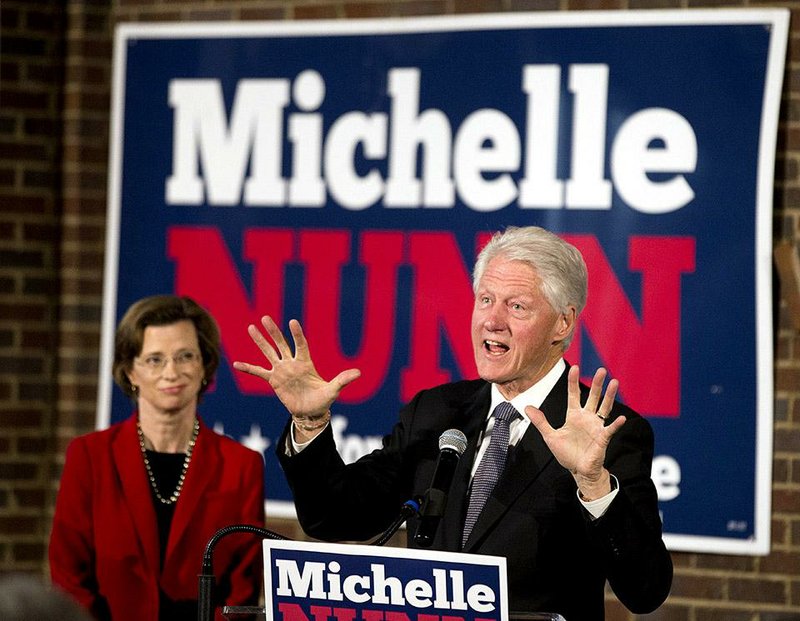WASHINGTON -- Early votes soared past 15 million across 31 states Friday, an outpouring that is giving Republicans and Democrats cause for optimism heading into the final weekend of a campaign with control of the Senate, the U.S. House and 36 governorships at stake.
Republicans pointed to a strong early-vote performance in Iowa as evidence that Joni Ernst was a step ahead in her bid to capture a Senate seat for the GOP. "I feel real good about it," said Gov. Terry Branstad, campaigning with the party's Senate hopeful as he sought a new term for himself, as well.
But in the Georgia U.S. Senate race, Democrats said a strong early turnout by blacks in the counties around Atlanta was a good sign for Michelle Nunn, running for a seat long out of the party's reach.
As candidates headed into a final weekend of campaigning, Democratic hopes of holding a Senate seat in Arkansas appeared to be fading, and Republicans already appeared assured of gains in West Virginia, South Dakota and Montana.The GOP needs to gain six seats to come away with the election's biggest prize -- control of the Senate during President Barack Obama's final two years in office.
Mail from Americans for Prosperity, a conservative group, is turning up in Arkansas, telling recipients that their "voting record may be examined for completeness" after the election. Democratic Party spokesman Patrick Burgwinkle said it showed out-of-state billionaires are determined to elect Rep. Tom Cotton over Sen. Mark Pryor "no matter how dishonest the tactic."
Meanwhile, strategists in both parties agreed privately that races in Louisiana and Georgia were probably headed for runoffs, and several Republicans expressed concern about Kansas, where polls showed Sen. Pat Roberts was in a tough race to keep a seat held by Republicans for decades.
Democratic incumbents in Alaska, Colorado and New Hampshire also faced difficult tests, as did Senate Republican Leader Mitch McConnell in Kentucky.
Republicans are all but certain to hold their majority in the House, and Democrats are working to minimize their losses in the campaign's final days by rushing help to candidates once viewed as safe.
The early vote turnout varied from state to state, exceeding 2010 levels in Louisiana, Wisconsin, Maryland, Florida, Iowa and Georgia. Most of those states are holding intensely competitive races for the Senate or governor or both.
In Louisiana, where Democratic Sen. Mary Landrieu is in a difficult three-way fight for re-election, the early vote was 80 percent higher than in the 2010 midterm elections.
In Iowa, figures provided by state election officials showed Democrats had cast about 41 percent of the early vote, Republicans about 39 percent and independents nearly 20 percent. Four years ago, Democrats held a double-digit advantage.
In Georgia, though, official figures showed an increase in heavily black counties accounted for all of the gain in early votes over 2010. Democrats have worked for months to bring so-called drop-off voters into the electorate, those who usually skip midterm contests.
In addition to Nunn's race against Republican businessman David Perdue, Jason Carter is challenging Republican Gov. Nathan Deal in the state with the highest unemployment in the country.
Wisconsin voters exceeded their 2010 early vote totals by 10 percent. Democrat Mary Burke is challenging Republican Gov. Scott Walker in one of the country's most closely watched elections. No party breakdown was available.
The early vote in Kansas was just shy of the 2010 totals, about 153,000 overall. Nearly 55 percent were cast by Republicans, but GOP officials privately expressed nervousness.
Roberts isn't the only Republican with a tough fight. Gov. Sam Brownback, whose agenda has been so conservative that it sparked a rebellion within his own party, is running against Democratic challenger Paul Davis.
On Friday, Obama campaigned in Rhode Island for gubernatorial contender Gina Raimondo. In a speech at Rhode Island College in Providence, he urged voters to support candidates who will back economic policies that benefit women as well as men.
Pushing for equal pay for women and a higher minimum wage, Obama said policies that ease financial and other burdens on women will help make the economy stronger overall.
He also promoted his health care law, which has become a Republican target in the campaign. He drew special attention to what he said were benefits aimed especially at women, such as mammograms without co-pays and insurance that can't be denied because of pre-existing conditions such as breast cancer.
Obama has been making appearances this week in Democratic states where he won in 2008 and 2012 to help mobilize core Democratic voters. Obama's fellow Democrats need a big turnout from female voters.
Information for thisarticle was contributed by Philip Elliott, Darlene Superville, Bill Barrow, Kelly Kissel, Catherine Lucey and Jennifer McDermott of The Associated Press.
A Section on 11/01/2014


